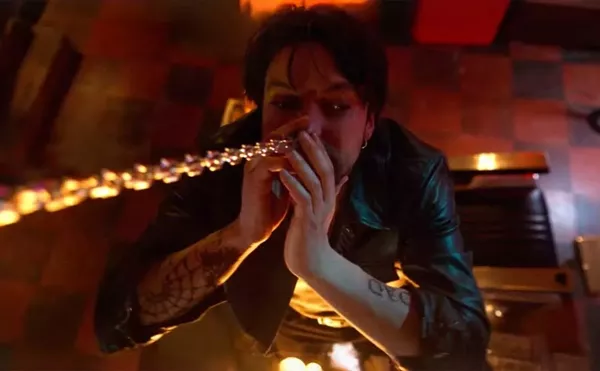
Audio By Carbonatix
[
{
"name": "GPT - Leaderboard - Inline - Content",
"component": "35519556",
"insertPoint": "5th",
"startingPoint": "3",
"requiredCountToDisplay": "3",
"maxInsertions": 100,
"adList": [
{
"adPreset": "LeaderboardInline"
}
]
}
]
You wouldn’t imagine that a page of literature would be a hot commodity at the Big Boy on East Jefferson. Teens cruising Belle Isle are usually more interested in the eatery’s greasy fare; the older neighborhood crowd goes for the Sunday brunch. So it came as a surprise a few weeks ago when a handsomely framed page from the 1999 novel Supreme Justice disappeared from a wall near the restaurant’s entrance.
“It makes me want to cry. It was so eye-catching,” says Elaine Lyell, Big Boy assistant general manager.
For nearly two years, Big Boy’s management had proudly displayed the page. Highlighted with a colored marker was a short passage in which characters in the thriller head to the restaurant to get a bite.
The novel’s author takes such misdemeanor enthusiasm for his work as a compliment. After all, writer and filmmaker Gary Hardwick is still a homeboy at heart, a guy who grew up where framings are stolen from restaurant walls. Hardwick is a success story — after growing up on Davison Avenue near Hamtramck he went on to get a law degree, write novels and tour as a stand-up comic. And now, Hardwick is finding Hollywood success with his tales and screenplays.
With the major release last spring of the romantic comedy Deliver Us From Eva, 2003 could be regarded as Hardwick’s breakout year. He wrote the screenplay and directed the movie, self-published a science fiction novel, Sex Life, using the pseudonym, A.A. Clifford, and is completing a sixth novel, Deuce and a Quarter. His 2001 book, Color of Justice, was recently purchased for screen adaptation by Universal.
Briefly home for the holidays, away from the hustle that has characterized his life for the past 10 years, Hardwick sits near the Big Boy’s front entrance. He probably wouldn’t want to admit it, but he looks pretty Hollywood — at least from the neck up. Wearing rectangular black shades, he chats on a hands-free cell phone, earpiece comfortably in place, listening to some gossip about an actress, he explains later.
But when he rises from his seat, it’s easy to see that while Hardwick left the east side, the east side never left him. Beneath the thick trench coat is a gray, block letter “Detroit” hooded sweatshirt, jeans and laceless sneakers.
Hardwick came to present a new copy of Supreme Justice to the restaurant’s management, while a couple employees point and talk quietly among themselves about the man whose work is at the center of the framed-page caper.
“I want a book,” a young hostess calls after Hardwick as he exits the building.
“I only brought that one. It is for sale, you know,” he says, smiling.
Hardwick says this is his fifth trip back to Detroit this year. Big Boy is a favorite of his, because it sends him down memory lane, to when he lived in Indian Village’s Parkstone Apartments. Many a morning on his way to work downtown, Hardwick says, he would stop at the Big Boy for breakfast. His days as a regular helped inspire one particular tableau in Supreme Justice, which he fondly recalls: “Someone tries to rob the restaurant, and there’s this off-duty officer who beats the guy down. The other people are cheering and yelling. You know Detroiters. We aren’t down with that kind of stuff.”
Other local mainstays the author has immortalized in print include the restaurants Mario’s and Fishbones. His forthcoming Deuce and a Quarter (Morrow) makes reference to Detroit-on-the-comeback landmarks Ford Field and Comerica Park. Even before his books and movies, Detroit landmarks worked their way into Hardwick’s comedy routines, something he did before he burst onto the film world.
“I told a joke about the big tire off I-94, and how coming into the city, it was the first thing you’d see,” he recalls. “Then later I’d tell them when they got into the city there’s a brother trying to unload an 80-foot hubcap.”
Twisting trails
A fascination with putting words on paper began when Hardwick was an adolescent. He says he used his imagination to escape the doldrums of urban life.
His upbringing and life in Detroit is a major inspiration for his work, says the novelist, screenwriter, lawyer and comic. Hardwick says he’s proud of his accomplishments, but not complacent.
“I came to California, but I didn’t leave Detroit behind me,” says Hardwick. “There’s this singular mentality (among Detroiters), a down-to-earth approach, an attitude that you have to have a means to an end.”
Hardwick has the striver’s mentality that comes from being the tenth of 12 children. His parents, Willie Steve and Mary Louise Hardwick, were solid working-class folk. His dad built Cadillacs for General Motors; his mom was a cook and worked as a maid in financially better-off homes. Mary Louise Hardwick died in 1986; her husband died three years ago. Older sister Amber Hardwick, a Detroit nurse, remembers how her brother mostly kept to himself as a child, watching cartoons and reading books.
“He became the shining star of the Hardwick clan,” she says. “When he shines, we all do.
“I just knew he would probably be as successful as he is because he has the ability to listen and observe,” she adds. “He always did say he would be famous.”
A 1978 Cass Tech graduate, Hardwick studied English at the University of Michigan, where, at 19, he became the youngest student admitted to the school’s graduate creative writing program. Following graduation, he veered off the creative route and attended Wayne State University’s law school, serving as class president. He later worked as a criminal defense and commercial lawyer for MichCon.
Not wanting to let his creativity go to waste, Hardwick began moonlighting at Detroit-area comedy clubs, including the Comedy Castle and Joey’s. Hardwick says he knew he could make people laugh from his experience self-publishing a humor magazine in Ann Arbor, not to mention the years of cracking up his captive-audience family. And, he needed an out from practicing law.
He began traveling to New York and Los Angeles to test his material on different audiences. Not unlike the multiple career roles he would later play as a screenwriter, director and novelist, Hardwick balanced performing with his legal work.
“By this time, I knew I wasn’t gonna be a lawyer, so it
didn’t really matter,” he says. “I knew I didn’t want to be a comedian, either, so there was no reason to give up the job. It was fun and I needed the money.”
Los Angeles, he eventually decided, would be a place where he could combine his writing with humor to make a living, so he and his pregnant wife moved there in the early 1990s.
“Everyone gets to a point where they feel the call to do something,” he says. “But I had never lived anywhere else but Detroit. I rarely ever left the state.”
Still, he tested the waters of career change before diving in completely. While practicing law on a full-time basis in California as an assistant to a U.S. attorney, Hardwick kept himself active with writing. The E.P. Dutton publishing company bought his first book, the thriller Cold Medina. Then, in 1993, he received the opportunity to take his career in the direction he saw it ultimately headed: writing for television and film.
After seeking inroads to Hollywood’s creative community without success, Hardwick was accepted to the Disney Writers Fellowship Program, where he distinguished himself from 600 applicants, landing a position writing for the short-lived sitcom, “Where I Live.” Now that the door had been opened, there would be no turning back for the newcomer. Hardwick found himself being sought after by agents and entertainment industry executives. But when he wrote his first screenplay, The Brothers, he was disappointed.
“They told me, ‘Nobody wants to see a movie about four brothers searching for their heart,’” Hardwick recalls.
In the era of 1991’s Boyz N the Hood and similar urban survival stories, Hardwick’s dramatic story of four black, professional men dealing with their relationships, and with one another, struck movie studio representatives as unrealistic.
He found quicker success with his second script, the teen comedy Trippin’, which was released on film in 1999. The Brothers was eventually released in 2001. But it wasn’t until this year that Hardwick gained significant acclaim for a movie credit.
Starring L.L. Cool J. and Gabrielle Union, the romantic comedy Deliver Us From Eva grossed $20 million at the box office and later debuted at No. 1 in DVD sales.
He credits his background and education with his success.
“I think a lot of things set me apart, not the least of which is my background,” Hardwick says. “There are not a lot of guys who have done stand-up comedy, written screenplays, written books and have a law degree.”
Fighting a stereotype
One of the challenges he has faced in the entertainment industry, Hardwick says, is a political one: Despite increasingly impressive box office showings, black filmmakers are still met with resistance by corporate heads, who aren’t convinced that more diverse stories by people of color are worth telling. The execs, says Hardwick, will only endorse and support what they believe sells in the black community, usually without having any true insight beyond stereotypical impressions.
An independent film movement, in which movies are made outside the purview of powerful, mainstream studios, is the only remedy for Hollywood’s restricted access, Hardwick says. He plans to make his next movie, the hip-hop tribute Radio, independent of any major studio.
“When they see that we’re doing it on our own, then they’ll say, ‘OK, you can make your movies,’” he predicts.
Hardwick says one of his next goals is to have a movie filmed in the community that nurtured him.
“You are a product of your environment in more ways than one,” he says. “I am a product of my inner-city upbringing in Detroit. That’s who I am.”
Hardwick’s Detroit roots are attractive in Hollywood, which is always hungry for gritty urban tales. “A lot of times, people will want to work with you because you’re different,” he says.
Cruising with Hardwick from his old East Jefferson stomping grounds to the swanky Townsend Hotel in Birmingham is like taking a class in Hollywood 101. He shares his gripes about the movie industry — between answering the questions of his curious driver about what it’s like to make movies. Hardwick describes an entertainment business that sounds more corporate than artistic.
Among topics that will make him cuss Detroit-style is Hollywood’s current move toward development teams. Practically gone are behind-the-scenes producers who simply pay for the movie, but stay out of screenwriting. Now, Hardwick says, most major film houses greet screenwriters with starched-shirt figures whose job it is to guide and oversee the filmmaking process. Hardwick resents this part of the process, viewing it as interference with an artist’s vision. Particularly for filmmakers of color, he says, whose ideas and experiences are already largely underrepresented in Hollywood, there’s often a problem of cultural conflicts.
Hardwick says he has generally enjoyed more autonomy when writing novels, which have ranged in subject from crime and suspense to Octavia Butler-style fantasy. Written in the tradition of Sam Greenlee’s The Spook Who Sat By the Door, Deuce and a Quarter will depict a government agent who gets caught up in a plot by his superiors.
Looking back at the gamble he took by leaving a secure career practicing law to do the work he loved most, Hardwick says he has no regrets: “In all things, you must take risks. You can’t be afraid of the consequences.”
Eddie B. Allen Jr. is a Detroit-based writer. E-mail letters@metrotimes.com




